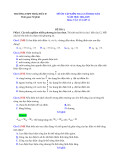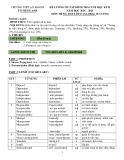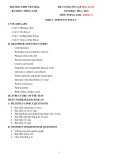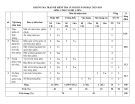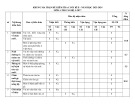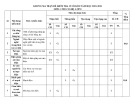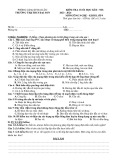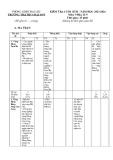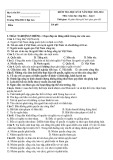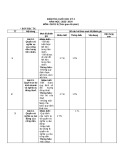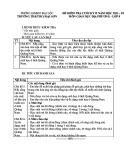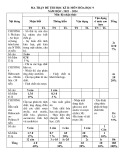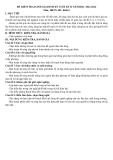
A. THEORY
- Pronunciation, vocabulary- Unit 6-9
- Language function- speaking Unit 6-9
- Grammar- Unit 6-9
I. MODAL VERBS FOR SPECULATION IN THE PAST/AT PRESENT
You can use modal verb structures to speculate things
- Must: used when you are sure something is/ was true.
- May/ might/ could: used when you think it’s possible sth is or was true.
- Can’t/ couldn’t: used when you are sure sth isn’t or wasn’t true.
Present: must/ maight/ may/ could/ can’t + V
Past: S + must/might/may/could/can’t + have + Vpp
Eg: It must be a lion. (Chắc chắn đây là con sư tử)
Eg: Yesterday, I saw abig animal. It must have been a lion.
Eg: They might have huge arms to lift the blocks of stone. (Có lẽ họ đã sử dụng những cánh tay khổng lồ để nhấc
những tảng đá lớn)
II. USED TO AND WOULD
-You can use USED TO + V or WOULD + V to talk about regualr past actions, past habits that no longer happpen.
-USED TO + V: talk about past things and situations that are no longer true (usually with stative verbs: be, have,
love…)
Eg: Harry used to be a good student.
- Don’t use USED TO/ WOULD + V for single past actions.
Eg: In 1963, my granddad bought his first car.
III. GERUND AS SUBJECT AND OBJECT
- Gerunds are forms of verbs ending with -ing that act as nouns. They can act as a subject or an object in a sentence.
●Gerund as subject: Taking care of your own health is very important for an independent life.
●Gerund as object: I find being self-reliant a very difficult thing to do.
IV. PERFECT GERUNDS AND PERFECT PARTICIPLES
-Perfect gerunds (Having Vpp): talk about events happening before the time of the main verb.
Eg: She was ashamed of having spent all of her money before the end of the year.
Eg: He denied having broken the window.
-Perfect participle (Having Vpp): used to reduce the time clauses or clauses of resaon when actions in these clauses
happened and finished before the action of the main verbs.
Eg: Having passed the exam, she felt happy. (Because she passed the exam, she felt happy)
Eg: Having finished her work, she went home. (After she had finished her work, she went home)
V. GIVE ADVICE
-It's (high) time + S + Ved/ V2 = It’s (high) time for sb to V
- It's (high) time + S + didn’t + Vbare
-S + had better (not) + Vbare
Eg: It's time we left the party. = It’s time for us to leave the party.
Eg: You had better finish your homework before bedtime.
VI. TENSES
1. FUTURE PERFECT
- Form: will have + past participle.
-Meaning: to talk about actions that will finish before a certain time in the future
- Signs: by 2025, by the time S + V(s/es)
Eg: By 2060, future builders will have used materials mined from older buildings to construct modern buildings.
Eg: By the time you are 18, you will have finished your secondary education.
2. FUTURE CONTINUOUS
-Form: will (not) + be + Ving.
-Meaning: to anticipate ongoing actions in the future or denote an action that will be happing at a specific time in
the future.
- Signs: at/ by this time next week, at 7 a.m. tomorrow ……
Eg: At this time next month, we will be taking the final exam.
VII. THE PASSIVE
1. FORM: BE + Vpp
- Used when it isn’t important/ you don't know who performed the action.
SỞ GD & ĐT HÀ NỘI
Trường THPT Phúc Thọ ĐỀ CƯƠNG ÔN TẬP HỌC KỲ 2
MÔN: TIẾNG ANH - LỚP 11 DISCOVERY
Năm học 2023- 2024





